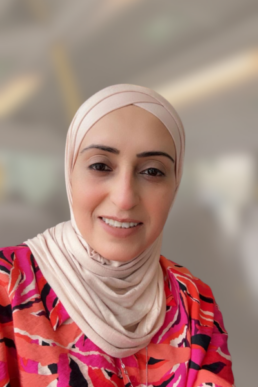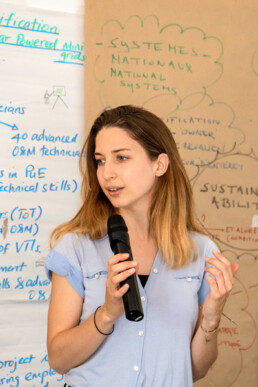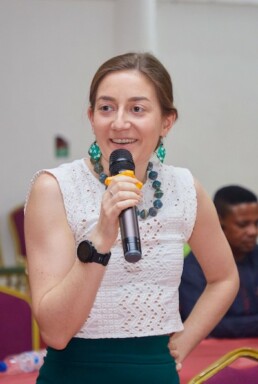1 consortium
Together, we have formed a consortium to promote opportunity-driven and inclusive Vocational Education and Training (VET) through a programme called VET Toolbox.
This avant-garde collaborative approach strengthens cooperation between the European Union and member states’ development organisations and among those development organisations and has paved the way for future Team Europe Initiatives.
2 donors
We are co-funded by the European Union (€ 30 million) and the German Government (BMZ) (€ 1 750 000).
A wide range of local partners
To implement our initiatives in selected countries, we collaborate with local partners from the private and public sectors.
About the programme
Context
Employment is key to development and inclusive growth. A main driver of employment is Vocational Education and Training (VET), which equips people with knowledge, skills and competencies that are in demand in the labour market.
Quality vocational education and training programmes are provided by educational institutions, by VET schools (as part of secondary or tertiary education), or may be part of initial training during employment, for example during an apprenticeship period or as a combination of formal education and workplace learning.
However, in many countries VET is undervalued and VET systems are, due to lack of private sector involvement and labour market intelligence, still inadequate.
In addition, they are often inaccessible to disadvantaged groups, e.g. youth, women, people from rural areas and people with disabilities.
Addressing these challenges requires clear prioritisation and particularly resources, which many countries do not have or are unable to mobilise. VET Toolbox provides partner countries with additional and punctual support to enhance or monitor planned or existent VET reform programmes.

Recognising the pivotal role of skills training, especially for young people, in increasing their chances for employment, the 2030 Agenda for Sustainable Development has set a number of ambitious targets under Sustainable Development Goal (SDG) 4 on quality education and SDG 8 on decent work and economic growth.
Vision & mission
Vision
Opportunity-driven and inclusive VET is integrated into labour market systems that foster economic and social development and higher participation in global value chains. These systems deliver skilled workforces for new and evolving decent jobs in an environment of investments.
Mission
We support VET reforms to make them more responsive to changing labour demands and inclusive to all. More particularly:
- We help to maximise the local social and economic benefits of European investments in Africa through targeted VET and skills development measures.
- We help to improve labour market information systems to enable evidence-based programming and decision making.
- We offer capacity building to Vocational Training Centres and other VET stakeholders such as VET authorities, the private sector, chambers or skills and training funds, to help deliver demand driven skills training that matches local job opportunities.
- We support a better match of labour market demand and supply resulting in higher job insertion.
- We facilitate public-private partnerships in VET and employment promotion in which each party contributes resources.
- We foster dialogue on policy and implementation level for sustainable in-country reform progress.
Guiding principles and values
All VET Toolbox activities should commit to this set of principles and values:
Opportunity-driven
Instead of improving VET to align with labour market skills needs, our projects begin by identifying job opportunities shaped by investments and market trends.
Employment impact
VET Toolbox activities are geared towards an improved employment situation for local people, activities aim at increased employability and job insertion.
Local value addition at the core
VET Toolbox activities aim at a benefit for local people and the local economy, by targeting local job creation and the growth of local SMEs.
Inclusion
VET Toolbox activities are inclusive and give special attention to people at risk of/experiencing exclusion with a special focus on gender balance.
Labour-market oriented VET
VET Toolbox activities support training programmes characterised by practice-oriented learning, complemented by quality (formal or informal) apprenticeships/internships and/or employment services. Ideally acquired skills are recognised and certified at national level.
Co-design/implementation
VET Toolbox activities are based on stakeholder involvement, considering the needs and the expertise of all important actors, like trainees, employers, investors, VET institutions and other private and public partners in the country, using synergies of cooperation to enhance outcomes.
Tailor-made design
VET Toolbox activities consider the different needs and opportunities identified, applying different approaches and methods that best fit the individual situation.
Decent work and social protection
VET Toolbox activities commit to respecting human rights and fundamental principles and rights at work to address decent work and social protection deficits.
Our team
Our Coordination team is based in Brussels, Belgium, and oversees the operationalisation of the VET Toolbox project in line with the project agreements and decisions by the Steering Committee. The Coordination Hub has the responsibility for overall monitoring, information and communication, processing of incoming requests, transfer of incoming requests and management of the Call for Proposals.
Each of the implementing agencies appointed a Liaison Officer to act as a link between the VET Toolbox and the respective development agency participating in the VET Toolbox partnership.
Our Liaison Officers act as the connection between the Coordination Hub and the implementing agencies. They are responsible for their agency’s outputs and they mobilise within their organisation the expertise needed for service delivery.
Together with the Coordination Hub these Liaison Officers compose the Operational Monitoring Committee. This committee meets regularly to coordinate and agree on decisions to be presented to the Steering Committee.
Coordination hub
Operational Monitoring Committee
Steering Committee
VET Toolbox is guided by a Steering Committee. This committee is the strategic body overseeing the project management to ensure that objectives are met in a measurable and verifiably manner and the services are implemented in accordance with sound, verifiable and transparent reporting and auditing standards.
Members of the Steering Committee:
- Representative of DG INTPA, co-chair
- Representative of Enabel, co-chair
- Representative of the British Council
- Representative of Expertise France
- Representative of GIZ
- Representative of LuxDev
Annual reports
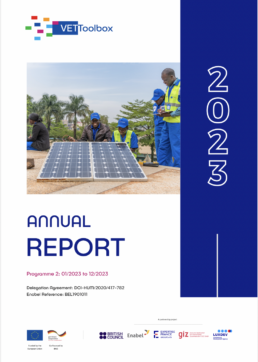
In 2023, VET Toolbox implemented 13 projects in 11 countries. GIZ completed six projects in five countries, while the other partners progressed on the remaining seven projects.
Targets are well on track and key achievements include initiating public-private dialogues in all countries, training 2,842 people in VET programmes, conducting tracer studies in five (out of six) GIZ projects resulting in employment for 1,420 graduates (of which 39% are women), and deriving policy recommendations from lessons learned across GIZ’s projects.
Gender inclusion (although targets were met) and decent work remain key challenges for the programme.
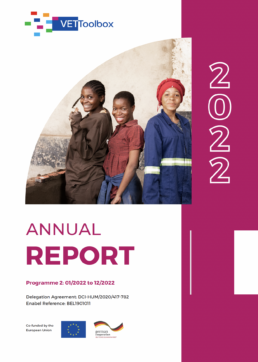
During Year 5, after the exploration of sectors and investment opportunities and the setting up of country partnership networks, implementation of the second VET Toolbox programme truly began in the country projects. 13 opportunity-driven projects were chosen and developed in 11 EU partner countries in Sub-Saharan Africa. The country projects found opportunities within the agricultural sector (4 projects), transport and logistics sector (3 projects), the digital sector (3 projects), construction sector (2 projects) and green sector (2 projects).
The projects followed different timelines. At the end of 2022, trainings had already started in 4 projects with a total of 1006 trainees, of which 44% women and 29% youth.
Would you like to know more?
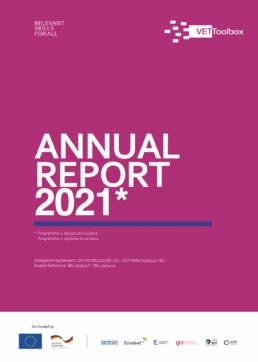
Despite two years of COVID-restrictions, very good project results were booked for the first programme during Year 4 of VET Toolbox. The achievements of this year clearly indicate that the programme is on track to achieve the final targets by the end of 2022. No progress against the logical framework (logframe) targets can yet be reported for the second programme, as the first year was a preparation and planning phase.
By the end of 2021, several quality insights and lessons were drawn in the 3 key thematic areas of the first programme, mainly from the short-term support actions and grant projects: private sector involvement, transition to the labour market and inclusion.
Moreover, lessons on the project design of both VET Toolbox programmes could be drawn during 2021.
Would you like to know more?
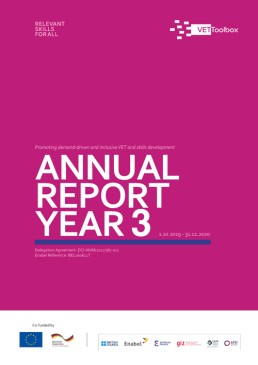
During Year 3, the VET Toolbox team focused on further developing the Monitoring, Evaluation and Learning (MEL) approach, reorienting communication activities and integrating a new VET Toolbox service in the existing structure. Unexpectedly, the response to the Covid 19-pandemic became top priority, demanding additional out-of-the-box solutions for tackling emerging challenges and seizing opportunities, including restrategising of activities.
Would you like to know more?
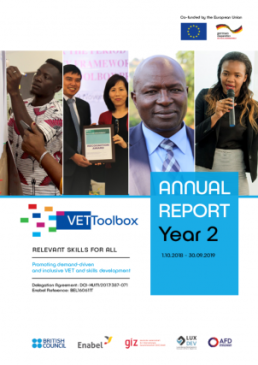
During its second year in operation, VET Toolbox advised 13 organisations (including Ministries of education, private compagnies and vocational training centres) in Africa and South East Asia on private sector onvolvement in VET, on labour market analysis and on inclusion in VET.
VET Toolbox awarded 11 innovative projects on inclusion in VET. The grants each target specific vulnerable groups (in total 4150 persons, below 35 years of age) i.a women at risk of exploitation, NEETs, persons with mental and/or physical disabilities, Internally displaced people (IDP’s), youth from rural areas, youth exposed to criminality. 40% of these are affected by several of these circumstances at the same time.
In 2019, VET Toolbox developed new tools on various topics such as:
- Transferable skills in VET
- How to establish a Sector Skills Council
- Life Skills and work readiness
- Qualifications that meet industry needs
- Inclusion of refugees in VET institutions
- Labour Market Analysis
- Self assessment of VET institutions
Would you like to know more?
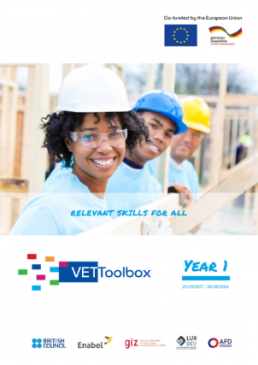
During its first year in operation, VET Toolbox has developed a five year business plan which prioritises demand-driven VET in developing countries, advised 9 organisations in 7 countries in private sector involvement, inclusiveness and evidence-based policy making in VET, built a strong and innovative partnership between 5 European leading Agencies, produced its first tool on the management of training institutions, launched a 4 million euros call for proposals on inclusion in VET, developed a brand new website sharing knowledge, stories and best practices in VET, officially launched VET Toolbox in Belgium, Ghana, Senegal, Mali and Vietnam, co-organised a regional seminar involving more than 100 participants from 18 African countries…
Would you like to know more about the VET Toolbox year 1?









